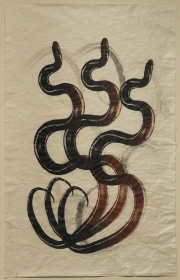Difference between revisions of "Gampi"
m (Text replace - "== Authority ==" to "== Sources Checked for Data in Record ==") |
|||
| (4 intermediate revisions by the same user not shown) | |||
| Line 1: | Line 1: | ||
| − | [[File:2002.84-SC32418.jpg|thumb|]] | + | [[File:2002.84-SC32418.jpg|thumb|Photograph on gampi<br>MFA# 2002.84]] |
== Description == | == Description == | ||
Paper produced from the short bast fibers obtained from the shrub, ''Wikstroemia canescens'', native to the mountainous regions of Japan. Gampi is a fine, fibrous paper made on a papermaking screen covered with a waterproof [[silk]] cloth. This results in the paper having a silk-like, woven appearance. While gampi is transparent, smooth, and strong, it has poor dimensional stability. Gampi is used as [[tracing paper]] and as interleaves for beating [[gold]], but not for linings. | Paper produced from the short bast fibers obtained from the shrub, ''Wikstroemia canescens'', native to the mountainous regions of Japan. Gampi is a fine, fibrous paper made on a papermaking screen covered with a waterproof [[silk]] cloth. This results in the paper having a silk-like, woven appearance. While gampi is transparent, smooth, and strong, it has poor dimensional stability. Gampi is used as [[tracing paper]] and as interleaves for beating [[gold]], but not for linings. | ||
| − | [[File:1997.108-SC78670.jpg|thumb|]] | + | [[File:1997.108-SC78670.jpg|thumb|Screenprint on gampi<br>MFA# 1997.108]] |
== Synonyms and Related Terms == | == Synonyms and Related Terms == | ||
| Line 10: | Line 10: | ||
''Wikstroemia canescens''; bird-skin paper; gambi; | ''Wikstroemia canescens''; bird-skin paper; gambi; | ||
| − | == | + | == Applications == |
| + | |||
| + | == Personal Risks == | ||
| + | |||
| + | == Collection Risks == | ||
| + | |||
| + | == Physical and Chemical Properties == | ||
Fiber width = 6-16 microns; Striation are fine and well-spaced. Parenchymal cells are rectangular with few structure. | Fiber width = 6-16 microns; Striation are fine and well-spaced. Parenchymal cells are rectangular with few structure. | ||
| − | == | + | == Resources and Citations == |
T.Collings, D. Miller, 'The Identification of Oriental Paper Fibers' ''The Paper Conservator'', vol 3, 1978. | T.Collings, D. Miller, 'The Identification of Oriental Paper Fibers' ''The Paper Conservator'', vol 3, 1978. | ||
| Line 26: | Line 32: | ||
</gallery> | </gallery> | ||
| + | == Resources and Citations == | ||
| − | + | * T.Collings, D. Miller, 'The Identification of Oriental Paper Fibers' ''The Paper Conservator'', vol 3, 1978. | |
* Matt Roberts, Don Etherington, ''Bookbinding and the Conservation of Books: a Dictionary of Descriptive Terminology'', U.S. Government Printing Office, Washington DC, 1982 Comment: Wikstroemia canescens | * Matt Roberts, Don Etherington, ''Bookbinding and the Conservation of Books: a Dictionary of Descriptive Terminology'', U.S. Government Printing Office, Washington DC, 1982 Comment: Wikstroemia canescens | ||
Latest revision as of 14:42, 29 October 2020
Description
Paper produced from the short bast fibers obtained from the shrub, Wikstroemia canescens, native to the mountainous regions of Japan. Gampi is a fine, fibrous paper made on a papermaking screen covered with a waterproof Silk cloth. This results in the paper having a silk-like, woven appearance. While gampi is transparent, smooth, and strong, it has poor dimensional stability. Gampi is used as Tracing paper and as interleaves for beating Gold, but not for linings.
Synonyms and Related Terms
Wikstroemia canescens; bird-skin paper; gambi;
Applications
Personal Risks
Collection Risks
Physical and Chemical Properties
Fiber width = 6-16 microns; Striation are fine and well-spaced. Parenchymal cells are rectangular with few structure.
Resources and Citations
T.Collings, D. Miller, 'The Identification of Oriental Paper Fibers' The Paper Conservator, vol 3, 1978.
Additional Images
Resources and Citations
- T.Collings, D. Miller, 'The Identification of Oriental Paper Fibers' The Paper Conservator, vol 3, 1978.
- Matt Roberts, Don Etherington, Bookbinding and the Conservation of Books: a Dictionary of Descriptive Terminology, U.S. Government Printing Office, Washington DC, 1982 Comment: Wikstroemia canescens
- Book and Paper Group, Paper Conservation Catalog, AIC, 1984, 1989
- The Dictionary of Paper, American Paper Institute, New York, Fourth Edition, 1980
- Bernard Toale, The Art of Papermaking, Davis Publications, Portland OR, 1983
- Silvie Turner, Which Paper?, Design Press, New York, 1991
- Art and Architecture Thesaurus Online, http://www.getty.edu/research/tools/vocabulary/aat/, J. Paul Getty Trust, Los Angeles, 2000
- The Dictionary of Art, Grove's Dictionaries Inc., New York, 1996 Comment: "Prints"




